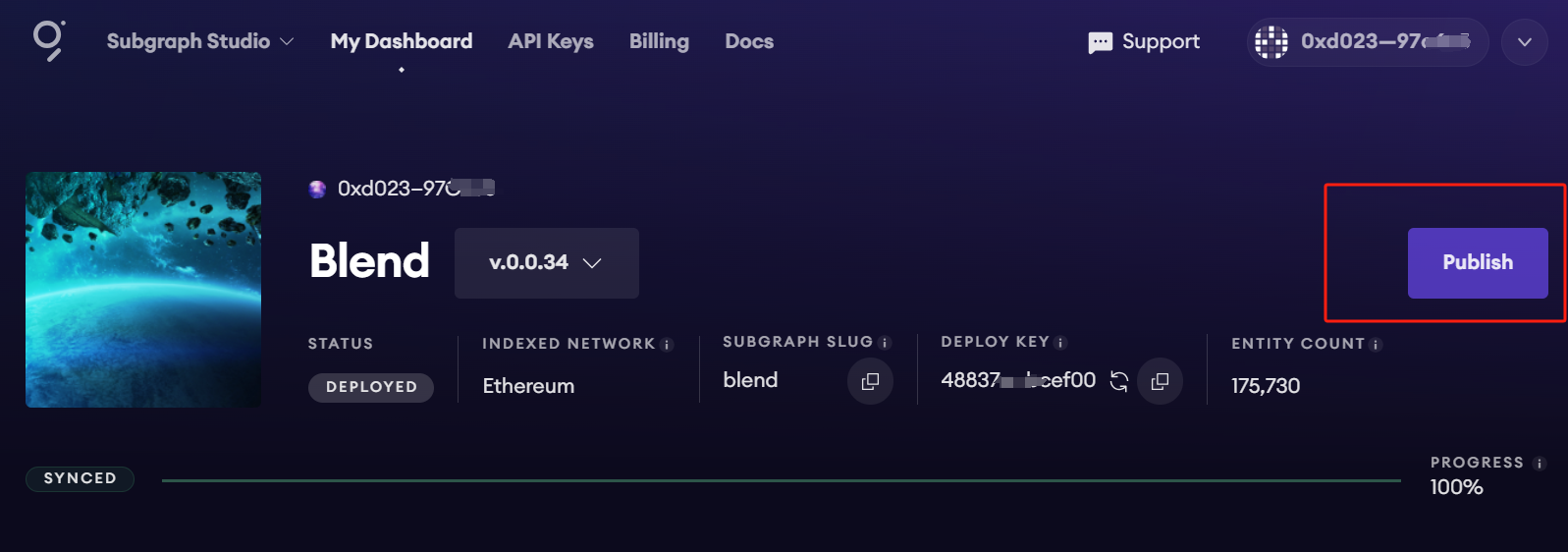3 minutes
Transfert à The Graph
Mettez rapidement à niveau vos subgraphs de n’importe quelle plate-forme vers le réseau décentralisé de The Graph.
Avantages du passage à The Graph
- Utilisez le même subgraph que vos applications utilisent déjà avec une migration sans temps mort.
- Améliorez la fiabilité grâce à un réseau mondial pris en charge par plus de 100 Indexers.
- Bénéficiez d’une assistance rapide pour Subgraphs 24h/24, 7j/7, avec une équipe d’ingénieurs sur appel.
Mettez à jour votre Subgraph vers The Graph en 3 étapes simples
1. Configurer votre environnement Studio
Créer un subgraph dans Subgraph Studio
- Accédez à Subgraph Studio et connectez votre portefeuille.
- Click “Create a Subgraph”. It is recommended to name the Subgraph in Title Case: “Subgraph Name Chain Name”.
Remarque : après la publication, le nom du subgraph sera modifiable, mais il nécessitera à chaque fois une action onchain, c’est pourquoi il faut le nommer correctement.
Installer Graph CLI
Vous devez avoir Node.js et un gestionnaire de paquets de votre choix (npm or pnpm) installés pour utiliser Graph CLI. Vérifiez la version la plus récente de CLI.
Sur votre machine locale, exécutez la commande suivante :
Utilisation de npm :
1npm install -g @graphprotocol/graph-cli@latestUtilisez la commande suivante pour créer un subgraph dans Studio à l’aide de la CLI :
1graph init --product subgraph-studioAuthentifiez votre subgraph
Dans Graph CLI, utilisez la commande auth vue dans Subgraph Studio :
1graph auth <your-auth-code>2. Déployez votre Subgraph sur Studio
Si vous avez votre code source, vous pouvez facilement le déployer dans Studio. Si vous ne l’avez pas, voici un moyen rapide de déployer votre subgraph.
Dans Graph CLI, exécutez la commande suivante :
1graph deploy <slug> --ipfs-hash <your-subgraph-ipfs-hash>Note: Chaque subgraph a un hash IPFS (Deployment ID), qui ressemble à ceci : “Qmasdfad…”. Pour déployer, il suffit d’utiliser cet IPFS hash. Vous serez invité à entrer une version (par exemple, v0.0.1).
3. Publier votre Subgraph sur The Graph Network

Interroger votre Subgraph
Pour inciter environ 3 Indexeurs à interroger votre subgraph, il est recommandé de curer au moins 3 000 GRT. Pour en savoir plus sur la curation, consultez Curation sur The Graph.
Vous pouvez commencer à interroger n’importe quel subgraph en envoyant une requête GraphQL dans l’endpoint URL de requête du subgraph, qui se trouve en haut de sa page d’exploration dans Subgraph Studio.
Exemple
Subgraph Ethereum CryptoPunks par Messari:

L’URL de la requête pour ce subgraph est la suivante :
1https://gateway-arbitrum.network.thegraph.com/api/`**votre-propre-clé-Api**`/subgraphs/id/HdVdERFUe8h61vm2fDyycgxjsde5PbB832NHgJfZNqKMaintenant, il vous suffit de remplir votre propre clé API pour commencer à envoyer des requêtes GraphQL à ce point de terminaison.
Obtenir votre propre clé API
Vous pouvez créer des clés API dans Subgraph Studio sous le menu “API Keys” en haut de la page :

Surveiller l’état du Subgraph
Une fois la mise à niveau effectuée, vous pouvez accéder à vos subgraphs et les gérer dans Subgraph Studio et explorer tous les subgraphs dans The Graph Explorer.
Ressources supplémentaires
- Pour créer et publier rapidement un nouveau subgraph, consultez le Démarrage Rapide.
- Pour découvrir toutes les façons d’optimiser et de personnaliser votre subgraph pour obtenir de meilleures performances, lisez davantage sur la création d’un subgraph ici.